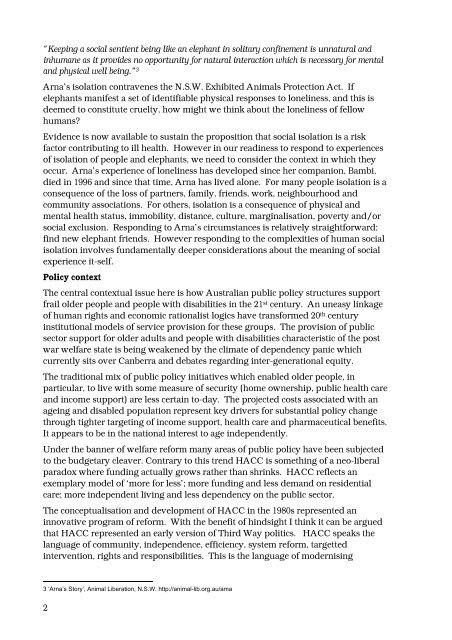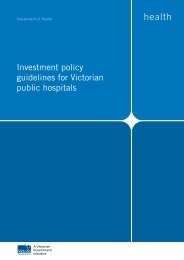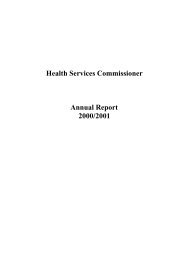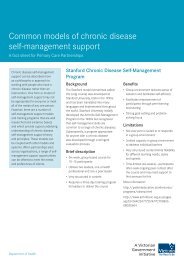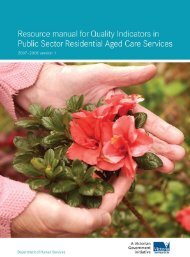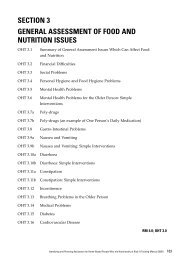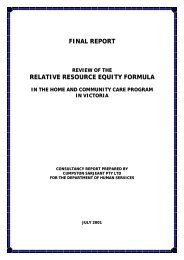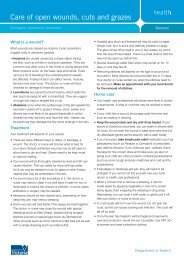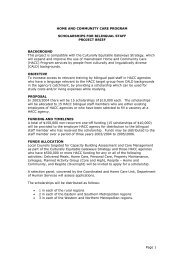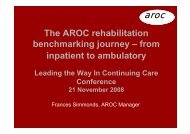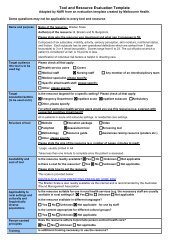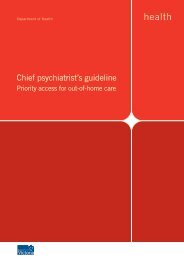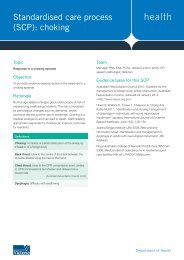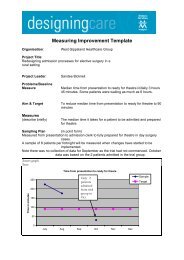Abstracts & Presentation Summaries - Department of Health
Abstracts & Presentation Summaries - Department of Health
Abstracts & Presentation Summaries - Department of Health
You also want an ePaper? Increase the reach of your titles
YUMPU automatically turns print PDFs into web optimized ePapers that Google loves.
"Keeping a social sentient being like an elephant in solitary confinement is unnatural and<br />
inhumane as it provides no opportunity for natural interaction which is necessary for mental<br />
and physical well being.” 3<br />
Arna’s isolation contravenes the N.S.W. Exhibited Animals Protection Act. If<br />
elephants manifest a set <strong>of</strong> identifiable physical responses to loneliness, and this is<br />
deemed to constitute cruelty, how might we think about the loneliness <strong>of</strong> fellow<br />
humans?<br />
Evidence is now available to sustain the proposition that social isolation is a risk<br />
factor contributing to ill health. However in our readiness to respond to experiences<br />
<strong>of</strong> isolation <strong>of</strong> people and elephants, we need to consider the context in which they<br />
occur. Arna’s experience <strong>of</strong> loneliness has developed since her companion, Bambi,<br />
died in 1996 and since that time, Arna has lived alone. For many people isolation is a<br />
consequence <strong>of</strong> the loss <strong>of</strong> partners, family, friends, work, neighbourhood and<br />
community associations. For others, isolation is a consequence <strong>of</strong> physical and<br />
mental health status, immobility, distance, culture, marginalisation, poverty and/or<br />
social exclusion. Responding to Arna’s circumstances is relatively straightforward;<br />
find new elephant friends. However responding to the complexities <strong>of</strong> human social<br />
isolation involves fundamentally deeper considerations about the meaning <strong>of</strong> social<br />
experience it-self.<br />
Policy context<br />
The central contextual issue here is how Australian public policy structures support<br />
frail older people and people with disabilities in the 21 st century. An uneasy linkage<br />
<strong>of</strong> human rights and economic rationalist logics have transformed 20 th century<br />
institutional models <strong>of</strong> service provision for these groups. The provision <strong>of</strong> public<br />
sector support for older adults and people with disabilities characteristic <strong>of</strong> the post<br />
war welfare state is being weakened by the climate <strong>of</strong> dependency panic which<br />
currently sits over Canberra and debates regarding inter-generational equity.<br />
The traditional mix <strong>of</strong> public policy initiatives which enabled older people, in<br />
particular, to live with some measure <strong>of</strong> security (home ownership, public health care<br />
and income support) are less certain to-day. The projected costs associated with an<br />
ageing and disabled population represent key drivers for substantial policy change<br />
through tighter targeting <strong>of</strong> income support, health care and pharmaceutical benefits.<br />
It appears to be in the national interest to age independently.<br />
Under the banner <strong>of</strong> welfare reform many areas <strong>of</strong> public policy have been subjected<br />
to the budgetary cleaver. Contrary to this trend HACC is something <strong>of</strong> a neo-liberal<br />
paradox where funding actually grows rather than shrinks. HACC reflects an<br />
exemplary model <strong>of</strong> ‘more for less’; more funding and less demand on residential<br />
care; more independent living and less dependency on the public sector.<br />
The conceptualisation and development <strong>of</strong> HACC in the 1980s represented an<br />
innovative program <strong>of</strong> reform. With the benefit <strong>of</strong> hindsight I think it can be argued<br />
that HACC represented an early version <strong>of</strong> Third Way politics. HACC speaks the<br />
language <strong>of</strong> community, independence, efficiency, system reform, targetted<br />
intervention, rights and responsibilities. This is the language <strong>of</strong> modernising<br />
3 ‘Arna’s Story’, Animal Liberation, N.S.W. http://animal-lib.org.au/ama<br />
2


